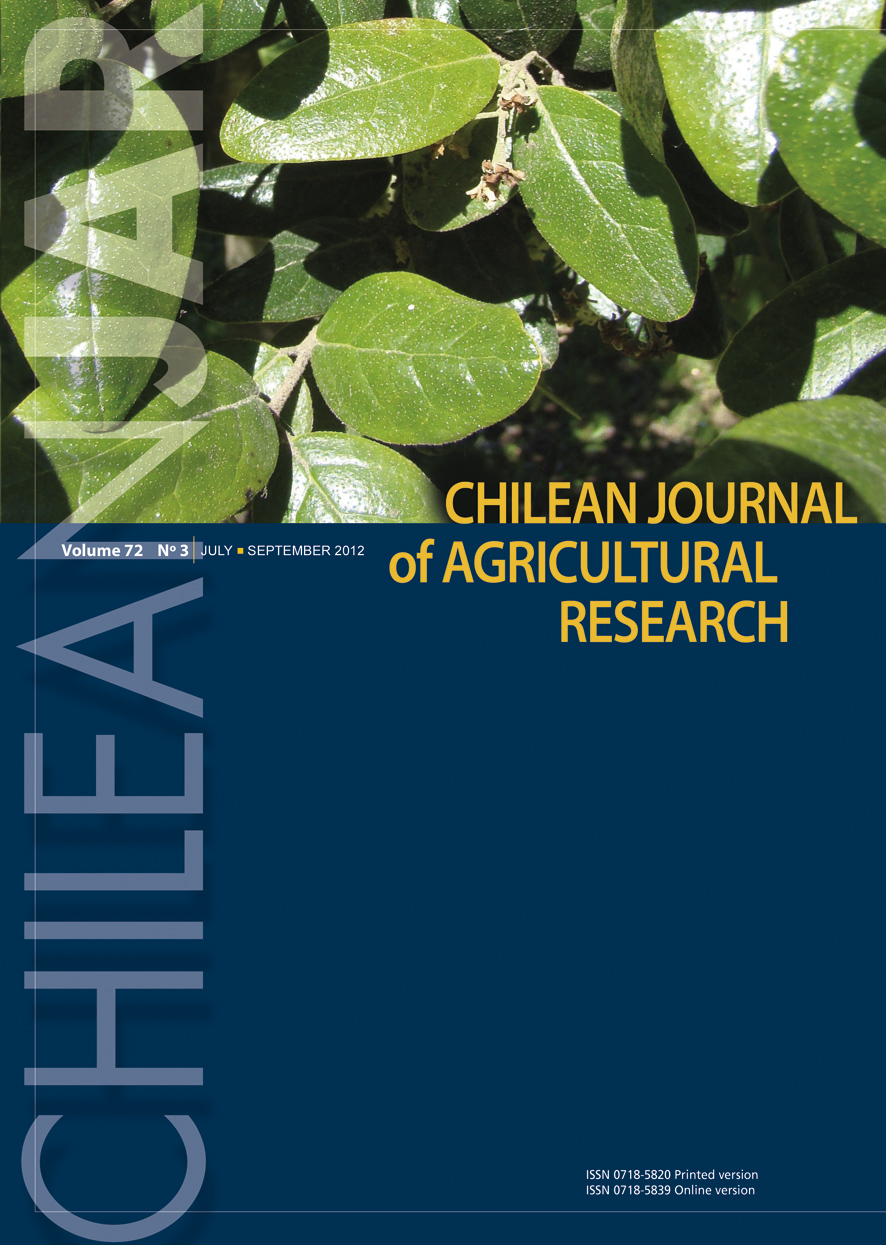
|
Chilean Journal of Agricultural Research
Instituto de Investigaciones Agropecuarias, INIA
ISSN: 0718-5820
EISSN: 0718-5820
Vol. 70, No. 3, 2010, pp. 474-484
|
 Bioline Code: cj10052
Bioline Code: cj10052
Full paper language: English
Document type: Research Article
Document available free of charge
|
|
|
Chilean Journal of Agricultural Research, Vol. 70, No. 3, 2010, pp. 474-484
| es |
Calendario de riego para aumentar la productividad del agua en rotación trigo-maíz en condiciones de cambio climático.
El Afandi, Gamal; Khalil, Fouad A. & Ouda, Samiha A.
Resumen
Se usó un calendario de riego para aumentar la productividad del agua en rotación trigo (Triticum aestivum L.)-maíz (Zea mays L.) en condiciones de dos escenarios de cambio climático. Tres variedades de trigo y dos híbridos de maíz se plantaron en un experimento de campo de 2 años. Se calibró el modelo CropSyst y se validó para los datos de campo colectados, luego se usó para evaluar el impacto de dos escenarios de cambio climático (A2 y B2) y tres estrategias de adaptación (siembra temprana, calendario de riego e interacción entre ambos) en el año 2038. Los resultados revelaron que el escenario A2 redujo más el rendimiento de ambos cultivos que B2. Pudo esperarse una alta reducción de rendimiento en rotación trigo-maíz bajo condiciones de cambio climático, en que el rendimiento de trigo y maíz será reducido en promedio 41 y 56%, respectivamente. La estrategia de adaptación más efectiva para trigo fue sembrar 3 semanas antes y riego cada 21 d, con ahorro de agua de riego y sin aumento de producción bajo el escenario A2 en ambas temporadas de crecimiento. Mientras bajo el escenario B2 el 2% de aumento en rendimiento ocurrió con 3% de ahorro de agua de riego aplicado en la primera temporada de crecimiento, en la segunda temporada el rendimiento pudo mejorarse en 8% con menos de 1% de aumento en el agua de riego aplicado y mayor productividad del agua.
Palabras-clave
evaporación de bandeja, CropSyst, HadCM3, escenarios de cambio climático, estrategias de adaptación.
|
| |
| en |
Using irrigation scheduling to increase water productivity of Wheat-Maize rotation under climate change conditions
El Afandi, Gamal; Khalil, Fouad A. & Ouda, Samiha A.
Abstract
Irrigation scheduling was used to increase water productivity of wheat (Triticum aestivum L)-maize (Zea mays L.) rotation under two climate change scenarios. Three wheat varieties and two maize hybrids were planted at in a 2-yr field experiment. CropSyst model was calibrated and validated for the collected field data, then was used to assess the impact of two climate change scenarios (A2 and B2) and three adaptation strategies (early sowing changing, irrigation schedule and the interaction between them) in the year of 2038s. The results revealed that A2 reduced yield more than B2 scenario for both crops. High yield reduction in wheat-maize rotation could be expected under climate change conditions, where wheat and maize yield will be reduced by an average of 41 and 56%, respectively.. The most effective adaptation strategy for wheat was sowing 3 wk earlier and irrigation every 21 d, with irrigation water saving and no yield improvement under A2 scenario in both growing seasons. Whereas under B2 scenario yield improvement by 2% occurred with 3% saving in the applied irrigation water in the 1 st growing season and in the 2 nd growing season yield could improved by 8% with less than 1% increase in the applied irrigation water and higher water productivity. Changing irrigation schedule was an effective adaptation option for maize, where yield improvement could occur under both climate change scenarios in both growing seasons by up to 9% with less than 3% increase in the applied irrigation water and higher water productivity.
Keywords
Pan evaporation technique, CropSyst, HadCM3, climate change scenarios, adaptation strategies
|
| |
© Copyright 2010 Chilean Journal of Agricultural Research.
Alternative site location: http://www.inia.cl
|
|
